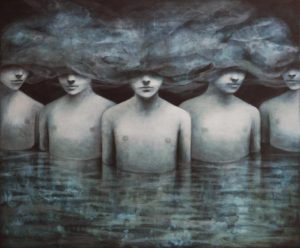Vive la Résistance!
Part Two: Sea of Lies

Social media is a perfect fit for the Trump brain, an organ that has proven itself creepily savvy without being intelligent.
Ideally, the media (from mediate) exists to provide a bridge of thought between a given news event and the mass mind. But Trump’s “shadow government by Twitter” (the Guardian) has gotten around this.
His febrile little midnight tweets, un-fact-checked and unmitigated by impulse control, are mainlined straight into the mob’s reptile brain. Remarkably, this campaign has provided enough popular capital to support Washington’s spiral into neofascism.
Which has, in turn, raised consciousnesses in this great land of ours. Many of us are being roused to political resistance. George Orwell’s 1984 is flying off the shelves at Amazon. Planned Parenthood and the ACLU are reporting record-breaking spikes in donations.
It’s a surge of activism that is nothing less than appropriate. After all, in this form of government, the buck is supposed to stop with us, right?
Psychic crisis
Meanwhile, let us stay mindful of the psychological dimension of the crisis: the danger of drowning in a sea of  lies. There’s so much shit flying around that we risk being unmoored by doubt about even the important, true things in the news.
lies. There’s so much shit flying around that we risk being unmoored by doubt about even the important, true things in the news.
Unable to keep track of each new outrage, many of us are, understandably, withdrawing out of psychic exhaustion.
But if we don’t keep our heads above water, we may become intellectually and morally incapacitated.
Swedish terror attacks?
What to make of him? The man is a shock, like the toy buzzer in a prank handshake, and the effect is to baffle and immobilize thought.
— David Bromwich, London Review of Books
The mainstream media seems to be disarmed by incredulity. Week after week, the press reacts – rather than responds – to the anti-fact juju spewing from the Trump cabal, such as last week’s “Swedish terror attacks” that never happened.
If journalists are going to cover each and every idiot tweet, I wish they would at least do so creatively. Wouldn’t it be great if each flamboyant lie were to be immediately countered by an equally flamboyant truth? Such as the one tweeted by the Financial Times: “A person is more likely to be killed by a vending machine than in a terrorist attack by a refugee.”
 An image like that sticks in your mind.
An image like that sticks in your mind.
Framing the debate
But there’s something more pernicious going here than merely letting this pussy-grabbing warthog in a red power tie (Sam Bee) get away with falsehoods.
It is that we are allowing his utterances to frame the debate.
Even when networks point out his lies, writes journalist Steve Coll, it is a trap. “Trump and his aides provoke conflict with the media to fire up supporters and renew the narrative of a people’s champion at war with the …establishment.”
Linguist George Lakoff calls our attention to the defensive language being used by embattled reporters (e.g. with their twitter hashtag “#NotTheEnemy”). He points out that active, confrontational language would stand a much better chance of igniting a meaningful public conversation.
Instead of scrambling to report each new tantrum, in a vacuum, journalists would do well to report on the patterns these tantrums form.
We would learn a lot from an in-depth examination, for example, of the connection between each new headline about the The Donald’s links to Russia and his rampages against the press that arise, like clockwork, immediately afterwards.
Get a grip
I find it heartening that the media’s fractured reactivity to Trump has itself become newsworthy. The public is hungry right now for a moral compass, and are calling upon the news agencies to muster up a cohesive plan. Bill Maher and Jon  Stewart, among others, are pointing out that this is the precise historical moment for journalists to get their groove back.
Stewart, among others, are pointing out that this is the precise historical moment for journalists to get their groove back.
What a powerful force it would be, if employees of the various news organizations, even the most cynical ones, united behind Trump’s antagonism – making good his characterization of them as the “opposition.” The New York Times could use its exclusion from Trump’s kangaroo-court press briefings to haul his administration over the coals.
They might be inspired to see themselves as part of a noble tradition of information warriors. (The image is not hyperbolic: all over the  world, journalists are being violently targeted like never before). I’d like to see them standing as one, defending any one of their colleagues who is being silenced or attacked.
world, journalists are being violently targeted like never before). I’d like to see them standing as one, defending any one of their colleagues who is being silenced or attacked.
The legendary I. F. Stone, that profile in journalistic courage, reported on Washington from well outside the Beltway press circuit. He knew that was the way to keep his information clean.
Critical thinking
But we must remember that Big Media is a corporate phenomenon. Like Stone, we must recognize its limits.
Even relatively intelligent networks are locked into the language of dualism: one side vs. the other. The state of emergency upon us right now, and the strong emotions that go with it, make this kind of black-&-white thinking all the easier to fall into. But if we value independent thought, we need to resist it.
The binary worldview shuts out critical thinking. If Trump is a loathsome sociopath, then Obama must have been a saint. All issues are reduced to pick-one-or-the-other.
By this reasoning, because I find the Trans-Pacific Partnership — which Trump condemns — a plutocratic, environmentally
 disastrous power grab, I must be a Trump supporter. And if I champion Marine LePen’s refusal to cover her hair at that summit in Lebanon, I must be a reactionary like she is. (1)
disastrous power grab, I must be a Trump supporter. And if I champion Marine LePen’s refusal to cover her hair at that summit in Lebanon, I must be a reactionary like she is. (1)
The powers-that-be are well served by our simplistic thinking. Divvying us into red-vs.-blue teams, they render our responses predictable and easier to manage. They’d find us far more difficult to control if we were thinking for ourselves.
To be continued.
Note
1 Among others, Michelle Obama, Angela Merkel, and her minister Ursula van der Leyen have also refused to cover their hair at such meetings.
Image Sources:
[swirling waters]: Jean Delville;
[figures in water]: Nadja Jovanovic
: Gérard Fromanger
Illustration for Victor Hugo’s La Conscience,1877: François-Nicolas Chifflart
The Roman Sun: Pelle Swedlund

